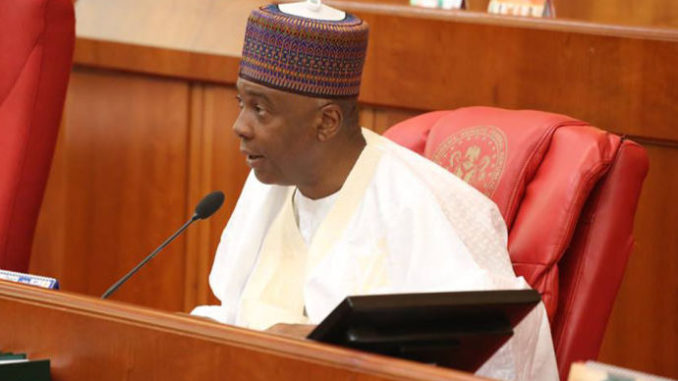
The Senate President, Bukola Saraki, on Tuesday said the issues of restructuring can be a “bit fanciful” in the North where insurgency persists.
Saraki said this while addressing Senators at a retreat in Katsina.
The Senate President called on Northerners to approach restructuring with an “open mind.”
Narrating his understanding of restructuring, Saraki said it is ”when everyone work towards economic development in every part of the country, so we can all take pride of place in the Nigerian project, and no region is seen as a weak link.
“My own restructuring is when we oversee the budget process to ensure equitable spread of critical infrastructure in every corner of the country, so that no region is left out of the gains of economic recovery. My own restructuring is when we create jobs and enhance food production so our people do not go hungry.
“My own restructuring is when we educate our children so that they can realise their full potential and partake in the promise of the future. My own restructuring is when we place a premium on delivering good governance, fight against corruption, valourise honesty and live to serve the people – without betraying the trust reposed in us.
“It is perhaps understandable if some in this gathering find the clamourous debate about restructuring a little irksome. We are, after all, meeting in a region that is, for want of a better word, beleaguered.
“In this region of ours – hurt and wounded by the cataclysm of insurgency and other problems – talk of restructuring can seem a bit fanciful. Nonetheless, we must face all issues with open minds, giving each the attention it deserves. I am confident that the Northern Senators Forum is up to the task.”
He admonished lawmakers to play their roles in improving conditions in the North East.
He said, “As we sit here today, we know that a number of challenges confront our region, one being the situation in the North-east, on which a lot still needs to be done. I am hopeful that the new North East Development Commission will go a long way in alleviating the difficulties being experienced in the zone.
“We all have a role to play in improving conditions on the ground in the North-east, so that those affected can move towards rebuilding their lives and communities – and look to a future beyond insurgency.”
On the issue of education, Saraki lamented the fact that accessing education in the North was a challenge.
He appealed to Senators to empower northerners to compete in equal terms with the rest of the country and the world.
“It is with that eye on the future that I call our attention, once again, to the estimated 12 to 15 million children not currently in the education system – the highest number of out-of-school kids in the world… It is a stain on our collective conscience that such a huge demographic is without education in the 21st century.
“We simply cannot abandon millions of Nigerian children to the trap of ignorance and poverty. It behoves us, therefore, to come up with policies that will lead to a significant decrease in the out-of-school population, and improve on the numbers as we go along. The crisis in education also manifests itself at tertiary level.
“When it comes to private universities in this country, the statistics tell the story: the North has the least number. However we look at it, access to education is a serious challenge in the North. We need to change the game, to empower our people to compete on equal terms with the rest of the country, and the world,” he said
On creating a vibrant economy in the north, Saraki said, “We have to create an enabling environment for economic activities, and mitigate those factors that discourage investment. It is clear that, as things stand now, there is little or no incentive for an investor to pursue economic activity in locations blighted by insecurity.
“We need peace and stability, therefore, for our economic objectives to have the chance to come to fruition. Beyond the headlines, the over-arching issues of the North have not gone away… Economic diversification is not just a buzzword; it is a real-life transition that must be made, if we are to deliver the dividends of democracy to our people.”